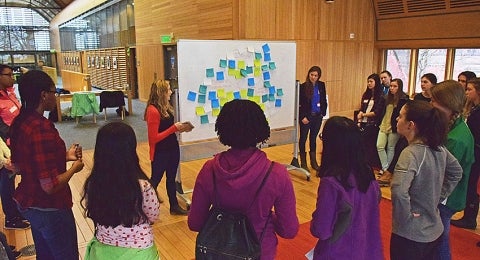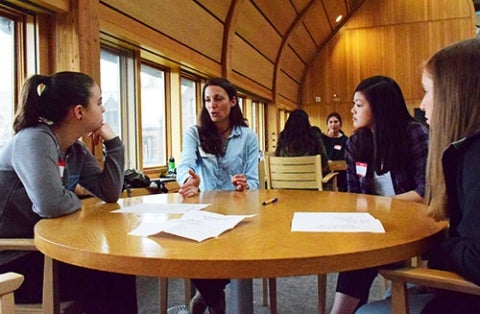Note: Yale School of the Environment (YSE) was formerly known as the Yale School of Forestry & Environmental Studies (F&ES). News articles and events posted prior to July 1, 2020 refer to the School's name at that time.
 Stefanie Wnuck ’16 M.E.M. reviews a goal-mapping exercise during a small group meeting with students at the “Green Careers, Women Leaders event.”
Stefanie Wnuck ’16 M.E.M. reviews a goal-mapping exercise during a small group meeting with students at the “Green Careers, Women Leaders event.”
High school students from across Greater New Haven visited Yale F&ES on April 2 for the fourth “Green Careers, Women Leaders,” an annual event in which F&ES students share leadership skills with young women from across the region and showcase the variety of environmental career paths available to them.
Co-hosted by the F&ES group EQUID (Equity, Inclusion, Diversity), this year’s event welcomed students from 13 high schools.
“The day is filled with a variety of activities: leadership training, mentorship between the students and the F&ES community, career panels with professionals, and a chance for the girls to network with other peers,” said Jessica Leung ’17 M.E.M., who led the event. “While students of all backgrounds are welcome, we specifically wanted to target urban schools and minorities.”
Individual sessions during the day included tours of Kroon Hall and the Yale Farm, an exercise in environmental writing, and discussions about green architecture and environmental justice. Students also learned about different fields of environmental research, why current F&ES and Yale College students and faculty decided to study the environment, and how young women can “flex their leadership muscles.”
We asked Leung a few questions about the event.
Jessica Leung: In high school, I just picked a major that my older cousins had chosen [economics] since it’s what I thought would be practical and lead to a job. I received very little support from my parents since we are all first-generation immigrants. And as the oldest of three, I had to figure out a lot of the college application process on my own. I wish I had reached out to my guidance counselors and teachers for more assistance on my applications and figuring out what fields to pick. I did not realize the importance of having mentors, to have people help read your essays or teach you about a discipline you may not have ever been exposed to.
Co-hosted by the F&ES group EQUID (Equity, Inclusion, Diversity), this year’s event welcomed students from 13 high schools.
“The day is filled with a variety of activities: leadership training, mentorship between the students and the F&ES community, career panels with professionals, and a chance for the girls to network with other peers,” said Jessica Leung ’17 M.E.M., who led the event. “While students of all backgrounds are welcome, we specifically wanted to target urban schools and minorities.”
Individual sessions during the day included tours of Kroon Hall and the Yale Farm, an exercise in environmental writing, and discussions about green architecture and environmental justice. Students also learned about different fields of environmental research, why current F&ES and Yale College students and faculty decided to study the environment, and how young women can “flex their leadership muscles.”
We asked Leung a few questions about the event.
What made you want to take the lead on this year’s “Green Careers, Women Leaders”event?
Jessica Leung: In high school, I just picked a major that my older cousins had chosen [economics] since it’s what I thought would be practical and lead to a job. I received very little support from my parents since we are all first-generation immigrants. And as the oldest of three, I had to figure out a lot of the college application process on my own. I wish I had reached out to my guidance counselors and teachers for more assistance on my applications and figuring out what fields to pick. I did not realize the importance of having mentors, to have people help read your essays or teach you about a discipline you may not have ever been exposed to.
I want them to see that females can be successful in their personal and professional lives and everyone’s measure of success is different.
Throughout college and in my years in the professional world, I have discovered that the path of discovery to one’s passions is rarely linear. In fact, it is a mixture of experiences and meeting the right people. I hope to give back to these students what I lacked in high school, and to encourage them to ask for help and to always be open to learning about new things. As a member of EQUID and personally passionate about education and access for minorities and underserved communities, this event was a perfect blend of my interests.
Also, while in grad school it’s nice to take a break from classes and have the opportunity to get your hands a little dirty in executing an event, especially one that provides positive benefits to the immediate community outside of Yale.
Leung: Since I am involved in another student mentoring organization on campus called “Many Mentors,” which also seeks to help minority and underrepresented students get interested in STEM fields [Science, Technology, Engineering and Math] after high school, I have found that if students are interested in science, often they are more interested in biology, chemistry, engineering or pre-med fields. Not as much knowledge of the environmental field exists among high schoolers. Although I know that some high schools offer AP Environmental Science and this is an entry point for them to gain some knowledge in the field.
Leung:For one, I hope they learn that it’s okay to ask for help in any regard and admit that you would like assistance. Self-recognition of your abilities is an important asset for life. I want them to see that females can be successful in their personal and professional lives and everyone’s measure of success is different. As the students grow into adulthood, they will learn more about what is important to them and what their measure of success will be.
Also, while in grad school it’s nice to take a break from classes and have the opportunity to get your hands a little dirty in executing an event, especially one that provides positive benefits to the immediate community outside of Yale.
Have you found that many of these high school students are interested in environmental careers?
Leung: Since I am involved in another student mentoring organization on campus called “Many Mentors,” which also seeks to help minority and underrepresented students get interested in STEM fields [Science, Technology, Engineering and Math] after high school, I have found that if students are interested in science, often they are more interested in biology, chemistry, engineering or pre-med fields. Not as much knowledge of the environmental field exists among high schoolers. Although I know that some high schools offer AP Environmental Science and this is an entry point for them to gain some knowledge in the field.
What do you hope the high school students take away from the event?
Leung:For one, I hope they learn that it’s okay to ask for help in any regard and admit that you would like assistance. Self-recognition of your abilities is an important asset for life. I want them to see that females can be successful in their personal and professional lives and everyone’s measure of success is different. As the students grow into adulthood, they will learn more about what is important to them and what their measure of success will be.
 Amber Roman ’16 M.E.Sc. offers advice to students during a session that allowed students to hear from F&ES students about their own career paths and interests.
Amber Roman ’16 M.E.Sc. offers advice to students during a session that allowed students to hear from F&ES students about their own career paths and interests.
The environmental field is incredibly interdisciplinary. Our world’s environmental problems require all kinds of problem solvers, whether they be trained in social, natural, or applied science. This is especially true for one of the world’s current largest problems, climate change. Everyone can find something they enjoy and a way to contribute solutions for society.
There is gender inequality that exists in the workplace of many fields but is especially true within STEM. One way to change this is to encourage girls (like the ones visiting us) to go into these fields and not be intimidated by this inequity. As more females enter the field and progress in leadership roles, they can help make big changes that can impact a large group of people. That being said, not everyone needs to climb to the top of their field or feel pressure to constantly excel just because of their gender. Rather, I think it’s about having confidence in the goals you want to achieve for yourself and not letting any societal norms or stereotypes hold you back in attaining them.
There is gender inequality that exists in the workplace of many fields but is especially true within STEM. One way to change this is to encourage girls (like the ones visiting us) to go into these fields and not be intimidated by this inequity. As more females enter the field and progress in leadership roles, they can help make big changes that can impact a large group of people. That being said, not everyone needs to climb to the top of their field or feel pressure to constantly excel just because of their gender. Rather, I think it’s about having confidence in the goals you want to achieve for yourself and not letting any societal norms or stereotypes hold you back in attaining them.
Published
April 6, 2016